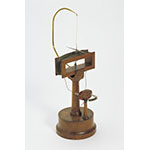A wooden base with support for a rectangular coil with wire. The wire ends of the coil terminate in two short glass tubes clamped to a small pedestal secured to the base. The coil is penetrated centrally by a glass tube containing a thin copper rod at whose ends are attached two flat magnetic needles, one inside and the other above the coil. The needles are suspended by a curved brass rod. The first multiplier by Johann Salomon Christopher Schweigger was very primitive. This model is based on Hans Christian Oersted's 1832 version of Schweigger's multiplier. The Museum's specimen carries no scale but, more importantly, has a pair of astatic needles, while the original instrument had a single magnetic needle. Provenance: Lorraine collections.










